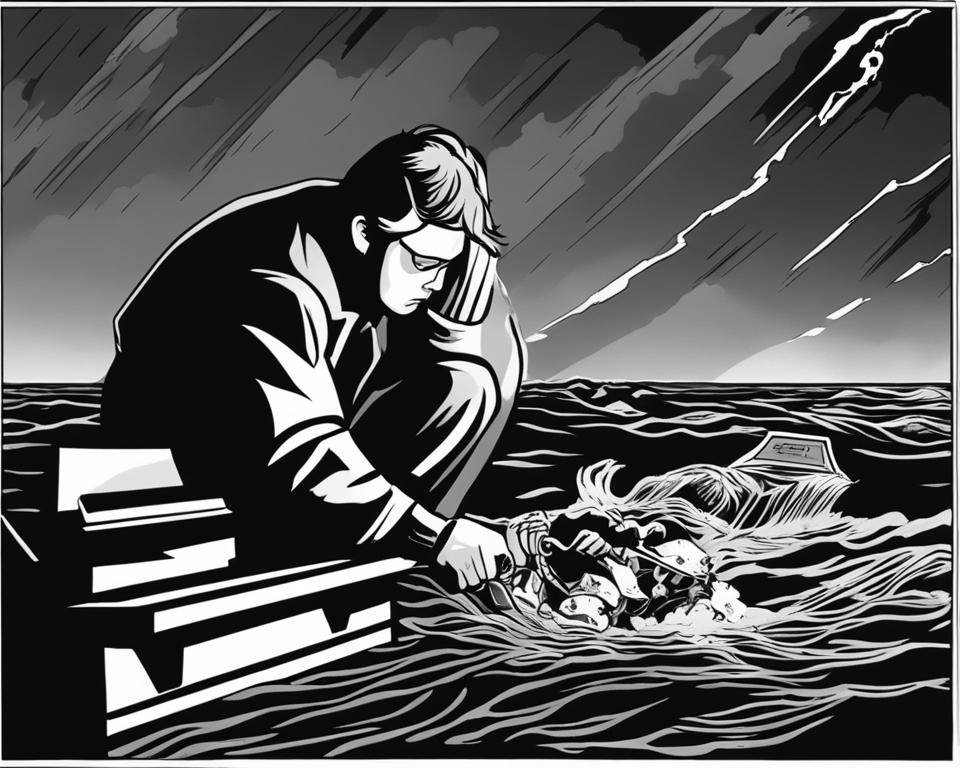If you find yourself struggling with credit card debt and unable to work out a solution with your credit card company, you may be wondering if they can take legal action against you. The answer is yes, credit card companies can sue you for unpaid debt. In fact, according to a study by the Consumer Financial Protection Bureau, around 23.5% of Americans have debt in collections status.
Defaulting on your credit card payments can lead to serious consequences, including debt collection lawsuits. If you ignore calls and letters from your credit card company or collection agency, a debt collection law firm may contact you. Approximately 15% of consumers contacted about a debt in collections are sued in civil court, as reported by the CFPB.
Understanding how debt collection lawsuits work and knowing your rights as a consumer is crucial when facing legal action for credit card debt. This article will guide you through the process, explore the steps you can take if you’re sued, and provide valuable information to help you make informed decisions about your situation.
Key Takeaways:
- Credit card companies can sue you for unpaid debt
- Ignoring calls and letters from your credit card company may result in debt collection law firms contacting you
- Understanding the debt collection lawsuit process is important
- Verifying the accuracy of the debt and seeking legal representation are crucial steps
- Negotiating a settlement, responding to the lawsuit, or exploring other options may help resolve the situation
Why Might a Credit Card Company Decide To Sue?
When you don’t keep up with your credit card payments as promised, your card issuer may call you, write you, or bring in a third-party debt collector. If you ignore calls and letters from your credit card company or collection agency, a debt collection law firm may contact you. This can lead to credit card legal action, including a credit card debt lawsuit, as a consequence of your credit card default. Understanding your credit card legal rights is crucial in such situations.
According to the Consumer Financial Protection Bureau (CFPB), around 15% of consumers contacted about a debt in collections are sued in civil court. It’s important to be aware of the potential consequences of failing to address your credit card debt and to take proactive steps to avoid credit card default consequences.
If you find yourself facing a credit card lawsuit, it’s essential to understand your rights, explore available options, and take appropriate action. Ignoring the situation can lead to unfavorable outcomes, including additional fees, collection costs, and potential loss of assets.
Credit Card Default Consequences
- Additional fees and interest charges
- Negative impact on your credit score
- Possible wage garnishment
- Potential property liens
- Freezing of your bank account
- Loss of assets in extreme cases
Understanding the potential consequences can help you make informed decisions about how to handle your credit card debt and protect your financial future.
Throughout this article, we will provide valuable information and practical guidance to help you navigate credit card legal action, understand credit card default consequences, and ensure you are aware of your credit card legal rights. Consulting with a qualified attorney who specializes in credit card debt and financial law is highly recommended.
Before we delve deeper into the topic, let’s take a moment to visualize the potential consequences of a credit card lawsuit. The table below provides an overview of the potential outcomes based on different scenarios:
| Potential Outcomes | Consequences |
|---|---|
| Default Judgment | Additional fees and collection costs |
| Wage Garnishment | A portion of your wages may be withheld to repay the debt |
| Property Lien | Debt collector may place a lien on your property, affecting your ability to sell or refinance it |
| Bank Account Freeze | Debt collector may freeze your bank account, limiting access to your funds |
How Does a Debt Collection Lawsuit Work?
When facing a debt collection lawsuit, it’s important to understand the process involved. While the specifics may vary by state, the general framework remains consistent. By familiarizing yourself with the key steps, you can better prepare to defend yourself and navigate the legal proceedings.
1. Summons and Complaint
Debt collection lawsuits typically begin when an attorney files a complaint in state civil court on behalf of the creditor or debt collector. Once the complaint is filed, you will receive a summons, which serves as official notice of the lawsuit. The summons will contain essential information, including the identity of the party suing you, the amount of money they seek to collect, and instructions on how to respond to the complaint.
2. Responding to the Complaint
After receiving the summons and complaint, it is crucial to respond promptly and appropriately. Typically, you will have a specified time frame (often 20-30 days) within which to file a formal response to the complaint. This response allows you to address the allegations made against you and present any defenses you may have. Failure to respond may result in a default judgment in favor of the plaintiff.
3. Discovery Phase
Once the initial complaint and response have been filed, both parties enter the discovery phase. During this stage, each side gathers evidence and information to support their case. This may involve exchanging documents, questioning witnesses, or conducting depositions. It is essential to comply with all discovery requests and deadlines to ensure a fair and thorough process.
4. Settlement Negotiations
Prior to going to trial, there may be opportunities to engage in settlement negotiations. This involves discussing potential resolutions with the opposing party or their legal representatives. Settlements can be reached at any point during the lawsuit, and they can help avoid the time, expense, and uncertainty of a trial. It’s important to carefully evaluate any proposed settlement and consult with an attorney to protect your rights and interests.
5. Trial
If a settlement cannot be reached, the case may proceed to trial. During the trial, both parties will present their evidence, call witnesses, and make arguments in support of their positions. The judge or jury will then make a decision based on the presented evidence and applicable laws. It’s crucial to be prepared, organized, and represented by an attorney who can effectively advocate for your rights and present your case.
6. Judgment and Enforcement
Following the trial, a judgment will be rendered. If the judgment is in your favor, the lawsuit will typically conclude, and the plaintiff will be responsible for any awarded damages or debt collection costs. However, if a judgment is entered against you, the court may authorize various collection methods, such as wage garnishment or property liens, to satisfy the debt. It’s important to understand the potential consequences of an adverse judgment and explore all available options to protect your rights and financial well-being.
In text must include SEO relevant keywords – credit card debt lawsuit, credit card lawsuit defense.
Steps to Consider If You’re Sued for Credit Card Debt
When facing a credit card debt lawsuit, it’s important to take immediate action and consider several steps to navigate the legal proceedings effectively. By following these steps, you can protect your rights and make informed decisions to address the situation:
1. Verify the Accuracy of the Debt
Before responding to a credit card debt lawsuit, it’s essential to ensure that the debt being claimed is accurate and belongs to you. Request written verification from the collector, asking for details about the debt, such as the original creditor, account number, and outstanding balance. This verification process will help you confirm the legitimacy of the debt and avoid any potential mistaken identity issues.
2. Seek Legal Representation
Consulting with an experienced attorney specialized in credit card debt lawsuits is crucial. An attorney can guide you through the legal complexities, determine your best course of action, and protect your rights throughout the process. They can negotiate a settlement on your behalf, answer the complaint, develop a strong defense strategy, or represent you in court, depending on your specific circumstances.
3. Determine Your Response to the Lawsuit
After seeking legal advice, carefully consider your options and decide on the most suitable response to the credit card debt lawsuit. Your attorney can help you weigh the pros and cons of each approach, such as:
- Settling the Debt: Negotiate with the creditor or debt collector to reach a reasonable settlement agreement. This may involve paying a reduced amount or establishing a monthly payment plan.
- Talking to a Credit Counselor: Seek guidance from a certified credit counselor who can assist you in managing your finances and developing a debt repayment plan.
- Going to Court: If you believe you have strong defenses or the debt is incorrect, you can choose to fight the lawsuit in court. However, it is important to have your attorney’s expertise to present your case effectively.
- Filing for Bankruptcy: In extreme cases, bankruptcy may be a viable option to address overwhelming credit card debt. Your attorney can guide you through the bankruptcy process and help determine if it is the right choice for your situation.
Each response has its own implications, and it’s crucial to carefully evaluate which approach aligns with your goals and financial circumstances.

What Happens If You Ignore a Summons?
Ignoring a summons for a credit card debt lawsuit can have serious consequences. When you fail to respond to a summons, the court may issue a default judgment against you. This means that the court automatically rules in favor of the plaintiff, and you could be held liable for the full amount owed, plus additional fees, collection costs, and interest.
Debt collectors will have stronger tools at their disposal to collect the debt if a default judgment is issued against you. These tools might include wage garnishment, property liens, or freezing your bank account, which can significantly impact your financial stability.
To avoid these consequences, it is crucial to respond to a summons promptly and seek legal advice if you are unsure about your options.
Remember, it’s always best to address credit card debt issues proactively rather than waiting for a lawsuit to be filed. Consult with an attorney who specializes in credit card lawsuit defense to understand your rights and explore potential strategies for resolving your debt.
| Consequences of Ignoring a Credit Card Debt Lawsuit Summons |
|---|
| Default judgment entered against you |
| Additional fees and collection costs |
| Interest added to the amount owed |
| Possible wage garnishment |
| Potential property liens |
| Freezing of bank account |
Verifying the Debt and Seeking Legal Representation
Before responding to a credit card debt lawsuit, it’s crucial to verify the accuracy of the debt. You have the right to ask for verification in writing and should send a certified letter to the party suing you. It’s also recommended to seek legal representation when facing a lawsuit, as an attorney can help negotiate a settlement, answer the complaint, craft a defense, or represent you in court. Legal aid programs or clinics may offer free or low-cost representation if you can’t afford an attorney.
| Benefits of Verifying the Debt | Benefits of Seeking Legal Representation |
|---|---|
|
|
“Verifying the debt is crucial to ensure that you are being held responsible for a legitimate amount. It’s important to gather all the necessary information and documentation to support your case. Seeking legal representation can provide the expertise and guidance needed to navigate the complex legal system and protect your rights as a consumer.”

Importance of Verifying the Debt
Verifying the debt is an essential step when facing a credit card debt lawsuit. By requesting written verification, you can ensure that the amount you are being sued for is accurate and that you are responsible for the debt. Sending a certified letter to the suing party not only creates a record of your request, but it also provides legal proof of your attempt to verify the debt.
Benefits of Seeking Legal Representation
When facing a credit card debt lawsuit, seeking legal representation can be immensely beneficial. An experienced attorney who specializes in credit card lawsuit defense can provide expert guidance and protect your rights throughout the legal process. They can negotiate with the opposing party to reach a fair settlement, answer the complaint on your behalf, develop a strong defense strategy, and represent you in court if necessary.
Legal aid programs or clinics may offer free or low-cost representation if you cannot afford an attorney on your own. These programs ensure that individuals have access to legal expertise, regardless of their financial situation.
Negotiating a Settlement
One option for dealing with a credit card debt lawsuit is negotiating a settlement. This involves reaching an agreement with the creditor or debt collector to pay a portion of the debt owed. By resolving the lawsuit through negotiation, you can avoid the time, expense, and uncertainty of going to court.
When negotiating a settlement, it’s essential to approach the process carefully and strategically. Here are some key points to keep in mind:
- Assess your finances: Before entering into any settlement discussions, take a close look at your financial situation. Determine how much you can realistically afford to pay and which payment options would be viable for you.
- Understand your rights: Familiarize yourself with your legal rights and protections. Knowing your rights can help you negotiate from a position of strength and ensure that any settlement agreement is fair and reasonable.
- Consult with an attorney: It’s wise to consult with an attorney who specializes in credit card lawsuit defense. An experienced attorney can provide valuable guidance, protect your rights, and help you navigate the negotiation process effectively.
- Communicate with the creditor: Open lines of communication with the creditor or debt collector. Express your willingness to resolve the debt and negotiate a settlement. Be clear and concise in your communication, and keep detailed records of all conversations and correspondence.
- Make a reasonable offer: Propose a settlement amount that you believe is fair and reasonable based on your financial circumstances. Consider offering a lump sum payment or a structured payment plan that fits your budget.
- Get the agreement in writing: Once you’ve reached a settlement agreement, make sure to get it in writing. The written agreement should clearly outline the terms of the settlement, including the agreed-upon amount, payment schedule, and any other conditions or provisions.
- Follow through on your obligations: Once the settlement agreement is in place, it’s crucial to fulfill your obligations as outlined in the agreement. Make timely payments and adhere to the terms of the settlement to avoid any potential legal consequences.
By negotiating a settlement, you can potentially resolve the credit card debt lawsuit in a way that is both financially manageable and legally satisfactory. However, it’s essential to have proper legal guidance throughout the process to protect your rights and ensure a fair outcome.
Example:
“Negotiating a settlement allowed me to take control of my credit card debt situation. With the help of my attorney, I was able to reach an agreement with the creditor that significantly reduced the amount I owed. It provided me with the opportunity to clear my debt and move forward with financial stability.” – John Smith
Responding to the Lawsuit by Filing an Answer
If you find yourself facing a credit card debt lawsuit and decide to fight it, one of the crucial steps is filing an answer to contest the suit. This formal written response allows you the opportunity to present any defenses you may have against the lawsuit.
When filing an answer, it’s essential to meet the deadlines set by the court. Missing these deadlines could result in a default judgment being entered against you, potentially leading to further financial and legal consequences. To ensure you adhere to the timeline, it may be beneficial to seek assistance from an attorney well-versed in credit card lawsuit defense.
Filing an answer provides you with the opportunity to have your day in court. It allows you to present your case, challenge the claims made against you, and assert any valid defenses you may have. By actively engaging in the legal process, you increase your chances of achieving a favorable outcome.
If you’re unsure about how to craft an effective answer or navigate the legal intricacies of defending against a credit card debt lawsuit, seeking the guidance of an attorney is highly recommended. An experienced attorney can ensure that your answer is comprehensive, properly addresses the claims made in the complaint, and adheres to the requirements set forth by the court.
Remember, your answer is a critical document in your defense strategy, so it’s important to be thorough and accurate in your response. Working with an attorney can provide you with the guidance and expertise needed to present a strong defense and protect your rights.

In the next section, we will discuss another option for resolving a credit card debt lawsuit—settling the debt before trial.
Settling the Debt Before Trial
When facing a credit card debt lawsuit, one option worth considering is to settle the debt before the trial date arrives. By reaching a settlement agreement with the creditor or debt collector, you may be able to resolve the issue without going through the lengthy and potentially costly trial process. This can be particularly beneficial if the amount you owe is manageable and settling the debt is within your financial means.
Settling the debt before trial has several advantages. Firstly, it can save you from the potential consequences of a trial, such as additional legal fees and the risk of an unfavorable judgment. By reaching a settlement, you can avoid the uncertainty and stress associated with a court hearing.
However, it is crucial to approach the settlement negotiation process with caution. Before agreeing to a settlement, carefully assess your financial situation and consider whether the proposed terms are realistic and feasible for you. It is recommended to consult with an experienced attorney who specializes in credit card lawsuit defense to guide you through the negotiation process and ensure your rights are protected.
The settlement negotiation process may involve presenting your financial situation to the creditor or debt collector and proposing a mutually agreeable payment plan. The goal is to reach an agreement that both parties find acceptable and that allows you to resolve the debt without undergoing a trial. An attorney can help you navigate the negotiation process and advocate on your behalf to secure the best possible outcome.
Remember, settling the debt before trial is not always the most suitable option for everyone. It is essential to carefully weigh the pros and cons, considering factors such as the amount of debt, your financial situation, and the likelihood of a successful defense in court. Consulting with a knowledgeable attorney will provide you with the guidance and expertise needed to make an informed decision on how to proceed.
Considering a Debt Management Plan
If you’re unable to settle the credit card debt or fight the lawsuit, a debt management plan (DMP) may be a viable option. A certified credit counselor can help you set up a DMP to pay off your credit card debt through monthly payments. Creditors may be willing to waive late fees, lower interest rates, and adjust your monthly payment amount through a DMP. It’s important to act quickly and allow sufficient time for the company suing you to accept your DMP proposal.
Settling credit card debt can feel overwhelming, especially when facing a lawsuit. However, a debt management plan provides a structured approach to alleviate your financial burden. By working with a credit counselor, you can develop a manageable payment plan that satisfies your creditors while still meeting your financial obligations.
How Does a Debt Management Plan Work?
A debt management plan is a formal agreement between you and your creditors. It involves making regular monthly payments to a credit counseling agency, which then distributes the funds to your creditors according to the agreed-upon terms. This type of plan typically lasts three to five years, during which you make consistent payments until your debt is fully paid off.
Here’s how a debt management plan can benefit you:
- Reduced interest rates: Creditors may agree to lower your interest rates, reducing the overall amount you owe.
- Waived fees: Late fees and penalties may be waived as part of the debt management plan.
- Consolidated payments: Instead of dealing with multiple creditors, you make a single monthly payment to the credit counseling agency.
- Financial education: Credit counseling agencies typically provide educational resources to help you improve your financial literacy and prevent future debt.
It’s important to note that a debt management plan may not be suitable for everyone. It’s crucial to evaluate your financial situation and consider the potential impact on your credit score and overall financial goals before enrolling in a DMP.
Choosing a Reputable Credit Counseling Agency
When considering a debt management plan, it’s essential to work with a reputable credit counseling agency. Here are some factors to consider when selecting an agency:
- Certification: Ensure that the credit counseling agency is accredited by a reputable organization, such as the National Foundation for Credit Counseling (NFCC).
- Experience: Look for agencies with a proven track record of helping individuals successfully manage their debt.
- Fees: Understand the agency’s fee structure and ensure it is reasonable and transparent. Avoid agencies that charge substantial upfront fees.
- Creditor relationships: A reputable agency should have existing relationships with major creditors, increasing the likelihood of securing favorable terms for your debt management plan.
Before committing to a debt management plan, take the time to thoroughly research and vet the credit counseling agency to ensure you are making an informed decision.
| Pros | Cons |
|---|---|
| Reduced interest rates | May impact credit score |
| Waived fees | Requires monthly payments |
| Consolidated payments | Long-term commitment |
| Financial education | May limit access to credit |
Going to Court and Defending Yourself
In certain situations, you may choose to take the credit card debt lawsuit to court and personally defend yourself. This option is particularly suitable if you firmly believe that you do not owe the debt, if the debt is time-barred, or if you have a strong defense to present.
Representing yourself in court is a possibility, but it is highly recommended to seek the assistance of an experienced attorney. By having legal representation, you can significantly increase your chances of achieving a favorable outcome.
Organizing your defense and meeting court-imposed deadlines is of utmost importance when defending yourself in a credit card debt lawsuit. This includes gathering all relevant evidence, preparing your arguments, and presenting your case in a clear and compelling manner.
Filing an Answer
One crucial step when defending yourself in court is filing an answer to the complaint. This formal written response allows you to contest the lawsuit and present any defenses you may have against the debt claimed by the creditor.
It is essential to carefully review the complaint and understand the allegations made against you. This will enable you to prepare a strong and well-supported response. Meeting the deadlines set by the court for filing an answer is critical to avoid potential consequences.
Seeking Legal Assistance
While representing yourself in court is an option, consulting with an attorney can provide valuable insight and expertise. An attorney experienced in credit card lawsuit defense can help you navigate the complexities of the legal system, guide you throughout the process, and ensure your rights are protected.
An attorney can assist you in crafting a solid defense strategy, understanding the applicable laws and regulations, and presenting your case effectively. They can also provide advice on settlement negotiations or potential alternatives to court proceedings.
Remember, the legal landscape can be complex, and having an attorney by your side can greatly enhance your chances of achieving a favorable outcome.
| Advantages of Seeking Legal Assistance | Representing Yourself |
|---|---|
|
|
Exploring Bankruptcy as an Option
When faced with overwhelming credit card debt and a pending lawsuit, exploring bankruptcy as an option may provide some relief. It is important to note that bankruptcy should be considered as a last resort due to its potential long-lasting effects on your credit score and borrowing ability. Consulting with an attorney who specializes in bankruptcy can help you understand if this is a suitable solution for your financial situation.
Bankruptcy can offer protection from creditors and provide you with a fresh start by eliminating or reorganizing your debts. There are different types of bankruptcy options available, including Chapter 7 and Chapter 13. With Chapter 7 bankruptcy, your non-exempt assets may be sold to pay off your creditors, while Chapter 13 bankruptcy involves creating a repayment plan to gradually pay off your debts over a period of three to five years.
Before proceeding with bankruptcy, it is crucial to consult with an experienced attorney who can guide you through the complex court process. They will help you evaluate your financial situation, assess the eligibility criteria, gather the necessary documentation, and navigate the legal requirements.
Bankruptcy Consequences
While bankruptcy can provide relief from overwhelming debt, it is important to be aware of the potential consequences. Filing for bankruptcy will have a negative impact on your credit score and may remain on your credit report for up to ten years. This can make it more challenging to obtain credit, secure loans, or rent a home in the future.
Additionally, bankruptcy may not discharge certain types of debts, such as student loans and child support obligations. Furthermore, it is essential to understand that bankruptcy should not be used as a way to avoid responsibilities or engage in fraudulent activities. It is a legal process that is subject to scrutiny by the court.
Bankruptcy and the Automatic Stay
One of the advantages of filing for bankruptcy is the automatic stay. When you file for bankruptcy, an automatic stay is initiated, which halts all collection activities, including the credit card debt lawsuit and any ongoing collection efforts. This can provide immediate relief and give you the opportunity to assess your financial situation without the pressure of legal action.
It’s important to note that while the automatic stay provides temporary relief, it does not absolve you from the responsibility to fulfill your obligations. Properly navigating the bankruptcy process, seeking legal advice, and working with an attorney is vital to ensure you understand your rights and obligations throughout the proceedings.
| Pros | Cons |
|---|---|
| Protection from creditors | Negative impact on credit score |
| Potential elimination of debts | Possible loss of non-exempt assets |
| Automatic stay on collection activities | Requirement to meet eligibility criteria |
| Fresh start and financial relief | Long-lasting impact on borrowing ability |
It’s important to thoroughly weigh the pros and cons of bankruptcy before making a decision. Consulting with an attorney who specializes in bankruptcy law can provide you with the necessary guidance and support to determine the best course of action based on your specific circumstances.

Understanding the Consequences of Ignoring a Lawsuit
Ignoring a credit card debt lawsuit can have serious repercussions. When you fail to respond to a lawsuit, a default judgment may be entered against you. This can result in additional fees and collection efforts, making it even more difficult to resolve your debt. Debt collectors are empowered with stronger tools to collect the debt, including wage garnishment, property liens, or freezing your bank account.
To minimize the potential consequences, it is crucial to take immediate action and respond to the lawsuit. Seeking legal advice to understand your options and rights is essential in navigating the legal process and protecting yourself from further financial strain.
Consequences of Ignoring a Credit Card Debt Lawsuit:
| Consequences | Description |
|---|---|
| Default Judgment | Failure to respond may lead to the court issuing a default judgment against you, giving the creditor the legal right to collect the debt. |
| Additional Fees | A default judgment can result in additional fees being added to the amount you owe, increasing the financial burden. |
| Collection Efforts | Debt collectors can escalate their efforts to collect the debt, employing strategies such as wage garnishment, property liens, or freezing your bank account. |
| Impact on Credit Score | Failure to address a credit card lawsuit can negatively impact your credit score, making it more challenging to obtain credit in the future. |
Responding to a lawsuit and seeking legal advice are crucial steps to mitigate the consequences of ignoring a credit card debt lawsuit. By taking prompt action, you can better protect your rights and work toward resolving your debt in a more manageable manner.
Protecting Your Rights as a Consumer
As a consumer facing legal action for credit card debt, it’s crucial to understand and protect your rights. The Fair Debt Collection Practices Act (FDCPA) is a federal law that safeguards individuals from harassment and abusive debt collection practices.
“Debt collectors must adhere to specific standards of conduct to avoid violating the FDCPA.”
Consulting with an attorney who specializes in credit card lawsuit defense can help you navigate the complexities of your legal rights. They can guide you on how to respond to debt collectors and take appropriate action if they violate the law. By understanding your rights, you can ensure a fair and lawful process throughout the credit card debt resolution.
Key Points:
- The Fair Debt Collection Practices Act (FDCPA) protects consumers from harassment and abusive debt collection practices.
- Debt collectors must adhere to specific standards of conduct to avoid violating the FDCPA.
- Consulting with an attorney can help you understand your rights and take appropriate action if a debt collector violates the law.
How National Legal Center Can Help
When facing a credit card debt lawsuit, it’s essential to have the right legal representation to protect your rights and navigate the complex legal process. National Legal Center is a debt relief law firm specializing in assisting individuals who are dealing with credit card debt lawsuits.
Our experienced attorneys understand the intricacies of credit card lawsuits and are dedicated to providing expert guidance and representation. We offer a range of services to help you in your credit card lawsuit defense:
- Verifying the Accuracy of the Debt: Our attorneys can assist you in verifying the accuracy of the debt claimed by the credit card company. We will help you request verification in writing and ensure that the debt belongs to you.
- Negotiating Settlements: We can negotiate with the credit card company or debt collector on your behalf to reach a favorable settlement. Our goal is to help you resolve the debt at a reduced amount that you can afford.
- Filing Answers to Lawsuits: If you decide to contest the credit card debt lawsuit, we will help you file an answer to the complaint. Our attorneys will assist you in crafting a strong defense and meeting all court-imposed deadlines.
- Exploring Legal Options: In addition to settlement negotiations and defense against the lawsuit, we can explore other legal options available to you. Our attorneys will analyze your unique situation and provide guidance on the best course of action.
Contact our experienced attorneys for a free consultation:
“National Legal Center is dedicated to assisting individuals facing credit card debt lawsuits. We understand the challenges and complexities involved and strive to protect your rights throughout the debt resolution process.”
At National Legal Center, we prioritize our clients’ interests and work tirelessly to achieve the best possible outcomes. Contact us today for a free consultation to discuss your credit card debt lawsuit and learn how we can help you.
| Benefits of Choosing National Legal Center | Why You Should Choose Us |
|---|---|
| 1. Experienced Attorneys | 1. We have a team of experienced attorneys with a deep understanding of credit card debt lawsuits. |
| 2. Expert Guidance | 2. Our attorneys provide expert guidance and representation throughout the debt resolution process. |
| 3. Personalized Solutions | 3. We offer personalized solutions tailored to your unique situation and goals. |
| 4. Free Consultations | 4. We provide free consultations to assess your case and discuss your options. |
| 5. Commitment to Protecting Your Rights | 5. We are committed to protecting your rights and ensuring a fair resolution to your credit card debt lawsuit. |
Conclusion
When faced with a credit card debt lawsuit, it’s crucial to take action and seek legal advice. Ignoring a lawsuit can lead to unwanted consequences, and it’s essential to understand your rights as a consumer. Whether you choose to negotiate a settlement, fight the lawsuit in court, or explore bankruptcy, consulting with an attorney can help you navigate the complex legal process and protect your rights.
At National Legal Center, we specialize in helping individuals facing credit card debt lawsuits. Our experienced attorneys can assist with verifying the accuracy of the debt, negotiating settlements, filing answers to lawsuits, and exploring legal options. We understand the stress and uncertainty that comes with a credit card lawsuit, and we are here to provide guidance and support throughout the process.
Remember, you have legal rights when dealing with credit card debt collection. It’s important to know and assert those rights to ensure fair treatment throughout the legal proceedings. Don’t hesitate to reach out to National Legal Center for a free consultation. We are dedicated to protecting your rights and helping you achieve the best possible outcome in your credit card debt lawsuit.
FAQ
Can credit cards sue you?
Yes, credit card companies have the right to sue you if you default on your credit card debt and are unable to reach a resolution with the company. The exact process and consequences may vary depending on state laws.
Why might a credit card company decide to sue?
Credit card companies may decide to take legal action if you consistently fail to make payments on your credit card debt. Lawsuits are typically seen as a last resort after attempts to collect the debt through other means, such as phone calls and letters, have been unsuccessful.
How does a debt collection lawsuit work?
A debt collection lawsuit usually begins with the card issuer or a third-party debt collector filing a complaint in state civil court. You will then receive a summons containing information about the lawsuit, including who is suing you and the amount they are seeking. It’s important to respond to the summons and seek legal advice.
What steps should I consider if I’m sued for credit card debt?
If you’re sued for credit card debt, there are several steps you should consider. First, verify the accuracy of the debt by requesting verification in writing from the collector. It’s also important to seek legal representation to negotiate a settlement, answer the complaint, craft a defense, or represent you in court.
What happens if you ignore a summons?
Ignoring a summons for a credit card debt lawsuit can result in a default judgment being entered against you. This can lead to additional fees, collection costs, and interest being added to the debt. Debt collectors may then have stronger tools, such as wage garnishment or property liens, to collect the debt.
How can I verify the debt and seek legal representation?
To verify the debt, you can request written verification from the party suing you. Sending a certified letter is a recommended method. It’s also advisable to seek legal representation to protect your rights and make informed decisions during the legal process. Legal aid programs or clinics may offer free or low-cost representation if you can’t afford an attorney.
What are my options for negotiating a settlement?
Negotiating a settlement involves reaching an agreement with the creditor or debt collector to pay a portion of the debt owed. It’s important to be cautious during the negotiation process and ensure that you can afford the settlement arrangement. Consulting with an attorney can provide guidance and protect your rights during negotiations.
How do I respond to the lawsuit by filing an answer?
If you choose to fight the credit card debt lawsuit, you may need to file an answer to the complaint. This is a formal written response that contests the suit. It’s crucial to meet the court-imposed deadlines and consider seeking assistance from an attorney to increase your chances of a favorable outcome.
Is settling the debt before trial an option?
Yes, settling the credit card debt before the trial date is an option worth considering. Depending on the amount you owe, settling the debt may be affordable and save you from potential consequences. However, it’s important to carefully evaluate the terms of the settlement and consult with an attorney for guidance during the negotiation process.
What is a debt management plan and how does it help?
A debt management plan (DMP) is a viable option for dealing with credit card debt. A certified credit counselor can help you set up a DMP to pay off your debt through manageable monthly payments. Creditors may be willing to waive fees, lower interest rates, and adjust payment amounts through a DMP. Acting quickly is crucial to allow sufficient time for the suing party to accept your DMP proposal.
How can I go to court and defend myself?
Going to court and representing yourself in a credit card debt lawsuit is possible. However, seeking the assistance of an attorney can improve your chances of a favorable outcome. It’s essential to organize your defense and meet court-imposed deadlines to present any defenses you may have against the lawsuit.
Should I consider bankruptcy as an option for credit card debt?
Bankruptcy should be considered as a last resort option for dealing with credit card debt. If you’re unable to pay the debt and facing a lawsuit, filing for bankruptcy can offer protection from creditors. However, it can have long-term effects on your credit score and borrowing ability. Consulting with an attorney is advised to determine if bankruptcy is a suitable solution for your situation.
What are the consequences of ignoring a credit card debt lawsuit?
Ignoring a credit card debt lawsuit can lead to a default judgment being entered against you, resulting in additional fees and collection efforts. Debt collectors may then have stronger tools to collect the debt, such as wage garnishment, property liens, or freezing your bank account. Responding to a lawsuit and seeking legal advice can minimize potential repercussions.
How can I protect my rights as a consumer in a credit card debt lawsuit?
As a consumer facing legal action for credit card debt, it’s important to know your rights. The Fair Debt Collection Practices Act (FDCPA) protects consumers from harassment and abusive debt collection practices. Consulting with an attorney can help you understand your rights and take appropriate action if a debt collector violates the law.
How can National Legal Center help with credit card debt lawsuits?
National Legal Center is a debt relief law firm that specializes in helping individuals facing credit card debt lawsuits. Our experienced attorneys can assist with verifying the accuracy of the debt, negotiating settlements, filing answers to lawsuits, and exploring legal options. We provide free consultations and strive to protect our clients’ rights throughout the debt resolution process.
Should I seek legal advice when facing a credit card debt lawsuit?
Yes, it’s crucial to seek legal advice when facing a credit card debt lawsuit. Ignoring a lawsuit can lead to unwanted consequences, and it’s essential to understand your rights as a consumer. Whether you choose to negotiate a settlement, fight the lawsuit in court, or explore bankruptcy, consulting with an attorney can help you navigate the complex legal process and protect your rights.





